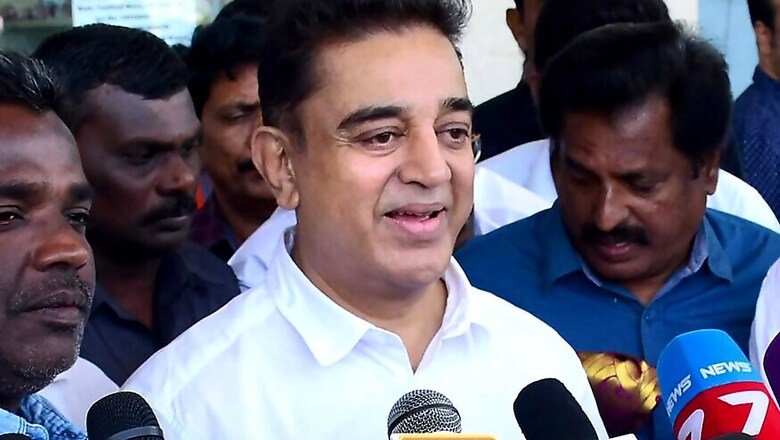
views
The entry into politics of superstar Kamal Haasan is yet another indicator of the level of frustration that the people of Tamil Nadu have experienced in recent years with the existing leadership of the state.
With the announcement of his plans on Wednesday to thousands of fans and VIPs, including Delhi Chief Minister and Aam Aadmi Party founder Arvind Kejriwal, Nammavar is emerging onto the political scene at an unprecedented nadir of partisan bickering and crumbling governance.
While making his case to the people of Tamil Nadu, Haasan must also be aware that he faces a challenger of gargantuan political status. The elephant in the room is his fellow actor and mega-superstar Rajinikanth, who carried the hopes of millions of his fans but made an incomplete announcement in the sense that he neither outlined a concrete political agenda, nor identified any solid contours of a political party or an election strategy in terms of alliances.
Will Haasan, who has until now nimbly avoided direct criticism of his off-camera friend, except for a reference to never allying with anyone flirting with "saffron" politics, avoid the pitfall of political vagueness?
Defining his politics
If, as he hinted at a recent speech at Harvard University, he intends to focus on developmental politics – as opposed to the unstated planks of caste or religious politics that other parties pander to – he would certainly make a mark in terms of standing apart from his rival.
Rajinikanth has so far only alluded to "spiritual" politics and in doing so raised concerns that this might be an overture to the Bharatiya Janata Party (BJP), a party that is desperately seeking to make inroads into this state, and may be willing to bankroll the hyper-popular actor who likely lacks the financial muscle to pull off a massive campaign.
But looking past Rajinikanth, a much greater shadow looms over Haasan’s entry. To stand any chance of scooping up the ultimate crown, the power to govern the Tamil Nadu, he needs to be both realistic and creative in taking on the titans of Dravidian movement, the ruling All India Anna Dravida Munnetra Kazhagam (AIADMK) and the opposition Dravida Munnetra Kazhagam (DMK).
The governance challenge
Fortunately for Haasan he has one immense advantage in this daunting venture: timing.
Ever since the passing of former Chief Minister and head of the AIADMK party Jayalalithaa, in December 2016, and the stepping back from active politics of DMK supremo M. Karunanidhi, two parallel developments have occurred: first, a leadership vacuum has engulfed the state, manifested in the ongoing implosion of the AIADMK in terms of bitter factionalism and a heretofore unresolved power struggle to control the reins of the party.
Second, the secular decline in governance quality that began at least as far back in time as the 1990s has accelerated. This has produced a massive rent-seeking and extortionate network built on a culture of political thuggery, which has permeated every corner of the government, and led to capital flight to neighbouring states.
It is this utter collapse in governance, reflected in the failure of the ruling party to execute government programmes efficiently and deliver relief to a state suffering multiple natural and man-made calamities, which could help Haasan transcend what would otherwise be considered an un-crossable chasm in his ambitions – his lack of a living connection to the Dravidian movement, very much a part of the consciousness of the ethnic Tamil man and woman of today.
That Dravidian feeling
It is true, Dravidianism no longer exists in its earlier, more radical forms anti-Brahminism, anti-Hinduism, anti-Hindi, and anti-North-India. Today it has given way to a much more broadly inclusive strand of political accommodationism that seeks to bring all Tamils on board, not just those who perceived themselves as oppressed by the upper castes of yesteryear.
Nevertheless, there is still a residual feeling of Tamil exceptionalism inside every common man, and it both motivates his voting behaviour and presents a unique opportunity to mobilise the masses. Haasan is not without inherent advantages in this context: his worldview appears to be consistent with those of the forbears of the Dravidian movement such as Periyar.
That he considers himself an atheist and rationalist cannot hurt his prospects, at least philosophically, in this state. Similarly his apparent leaning toward Left-of-centre politics and distaste for Hindutva suggests that he is in tune with Tamil Nadu’s historical preoccupation with mass welfarism and that he has moved past his own Brahmin origins. In being equally comfortable with Tamil and English he has opened up the door to straddle both the worlds of the elites and the masses in this state, and that would be an important asset for any future leadership role.
Would-be messiah
However the riddle that Haasan will have to solve is this: what are the most urgent needs of this common man – and woman – today, and what are the most efficacious means of signalling that he is the best candidate to deliver on that need? Secondary questions that he will necessarily have to answer revolve around the nature of the party organisation that he will build up to make such political action a reality – will it have sufficient capacity in terms of resource allocation? Will he be able to imbue such an organisation with a culture that eschews rent-seeking?
In the age of political gimmickry and social media Haasan may encounter numerous temptations along the route to his hoped-for political ascendancy – he may get bogged down in fights over his roots, his lack of political experience, and certainly his political leanings. If he can step past the inevitable obstructionism that he will encounter in this venture, he may yet emerge as the much-needed vector of political uprightness that Tamil Nadu so desperately craves.
(Narayan Lakshman is an Associate Editor at The Hindu.)




















Comments
0 comment